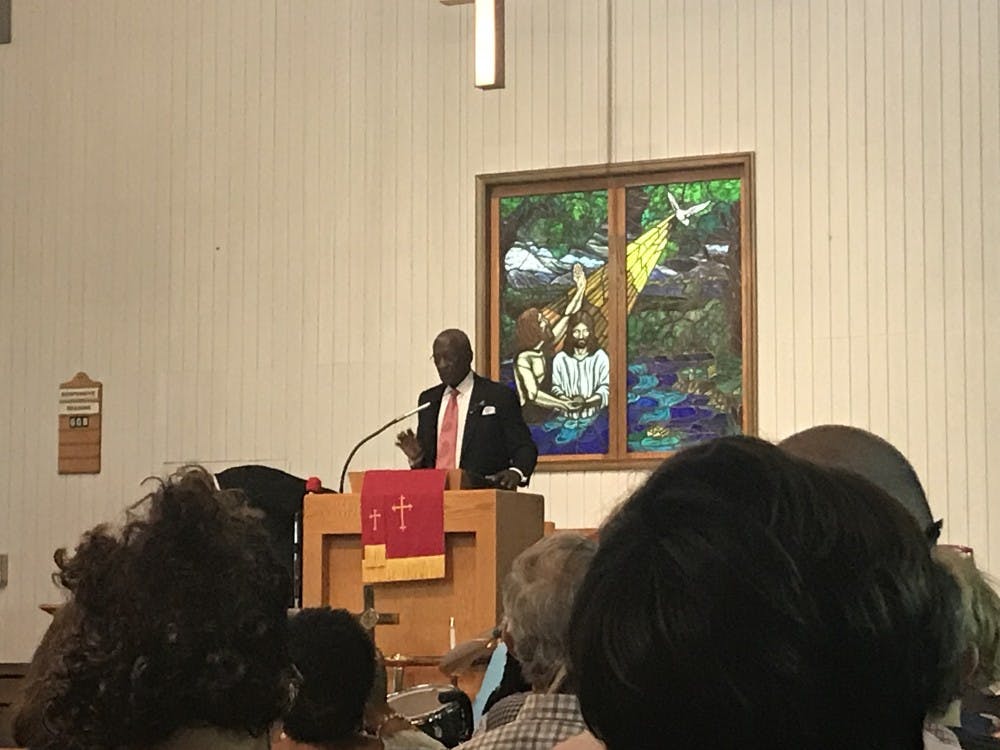On the one-year anniversary of the deadly Unite the Right rally, the National Association for the Advancement of Colored People hosted a “Time for Reflection and Healing” forum at the Zion Union Baptist Church Sunday evening. Among the speakers, past-president for the Albemarle-Charlottesville NAACP M. Rick Turner, University President Jim Ryan, Susan Bro and Assoc. History Prof. John Mason called for change against ongoing racism in Charlottesville.
Ryan — who began his tenure as the University’s ninth president at the beginning of the month — reiterated his apology to protesters present at the torchlit white supremacist march on Grounds last August and acknowledged their hardships.
“I can’t imagine what it was like being there … experiencing the pain and the trauma, injuries, and deaths,” Ryan said.
Ryan first apologized to last year’s protestors at “The Hope that Summons Us: A Morning of Reflection and Renewal,” which the University hosted Saturday.
At Sunday’s event, Ryan shared a story about a group that had come together at St. Paul’s Church — just across the street from the Rotunda — on Aug. 11 last year to pray over what was going to happen that weekend with the Unite the Right rally expected the following day. The group was told by police to stay in the church as white supremacists gathered on Grounds and marched closer to the area.
An independent review of the events of Aug. 11 and 12 by former U.S. Attorney Tim Heaphy also documented active threats made against the church and parishioners that evening.
“As the group inside listened to the chants and violence and saw flames through the windows, fear began to rise that someone might set the church on fire,” Ryan said. “So those inside sang. On a night filled with so much hate, the people in that church tried to drown it out with love. May we all follow in their example.”
Ryan also focused on the history of racism in Charlottesville, saying that such injustice was one of the reasons he accepted the position as President.
“It was in watching what happened [last year] that I decided to accept the offer,” he said. “I had a feeling that what happened last year would pull conversations out that were long overdue.”
Bro, the mother of Heather Heyer — the 32 year old who was killed when a car drove into a crowd of counter-protesters at the Unite the Right rally last year — spoke candidly about the loss of her daughter and the events that surrounded her murder and memorial. Bro asked that people focus on the current issues of racism in the community instead of the death of her daughter.
“I’m tired because the world acts like one white girl dying is the end of the world.,” Bro said. “The last month I’ve spent 14 hour days dealing with press. Did Trayvon Martin’s mother get that?”
Earlier in the day, Bro spoke at a memorial for her daughter on the anniversary of her death on Fourth Street in downtown Charlottesville.
Turner said now is the time to confront these problems of racism and injustice, not side-step them.
Turner reminded the crowd that there are two Charlottesvilles — one black and one white. Turner said the textbooks in local schools must reflect justice, citing the Southern Poverty Law Center study that showed that only 8 percent of the high school seniors they surveyed could identify slavery as the main cause of the Civil War.
Mason spoke on the many ways that racism is perpetuated in Charlottesville today, noting that Charlottesville had problems long before the white supremacists came last August.
Providing a current example of racial injustice, Mason noted that University dining hall employees and custodial staff, many of whom are black, not being paid living wages — an hourly rate that allows an individual to support a family when working full time — or having the opportunity to earn higher positions. The University’s current minimum pay for entry-level employees is $12.38 an hour, though this does not include contracted workers, such as employees of Aramark food services, who can make as little as $7.25 an hour. According to MIT’s Living Wage Calculator, a living wage in Charlottesville is $12.02 an hour.
“I’m grateful to a new generation of activists … you have the opportunity to change,” Mason said. “We have to repair the damage.”
Mason spoke directly to Ryan about a nickname for the University among black community members — the plantation — because of its long history of injustice.
“I’m not here to praise you,” Mason said, directed at Ryan. “I’m here to welcome you to the plantation.”
Ryan, who spoke after Mason, acknowledged Mason’s statements.
“This is my twelfth day as president at the University of Virginia,” Ryan said, “and apparently, I have a fair bit of work to do.”
Correction: This article originally misstated the University’s minimum wage as $11.76 an hour. It has been updated to reflect the current minimum wage of $12.38 an hour.







